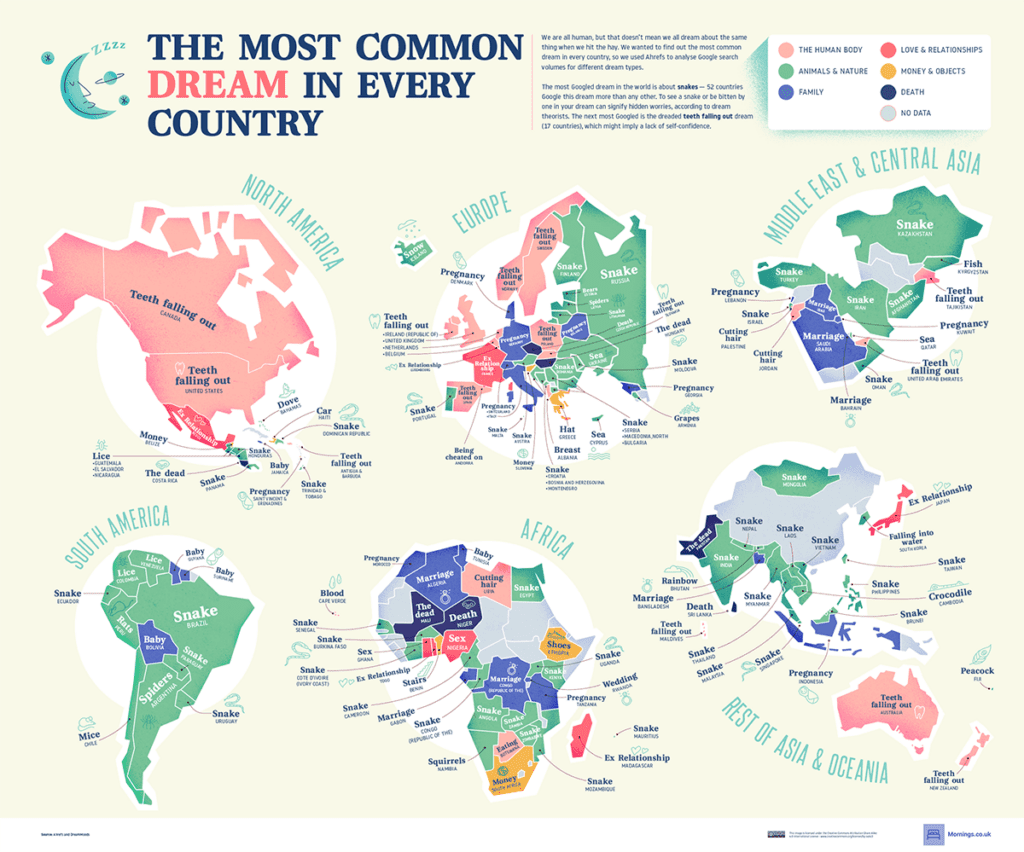Earlier this year a team from sleep website Mornings.co.uk conducted an analysis on Google search data, to see what the most commonly-searched dreams were in each country.
Though largely missed at the time, the breakdown reveals a few interesting insights into dreams around the world and provides a bit of reassurance to anyone who thinks they are the only person to have that dream about their teeth falling out of their face.
The team looked at data (where available) of the most common dream searches on Google, breaking it down by country as well as providing a worldwide overview. In terms of the world, the most common dream searched was about snakes. Snake dreams are searched an astonishing 352,000 times a month in Brazil according to the analysis, and 214,000 per month in Turkey. Areas where venomous snakes exist tended to see snakes topping the list, perhaps unsurprisingly.
Interestingly, snakes were also a common feature of dreams in countries that don’t have to worry about the threat of venomous snakes. In the UK, where any snake bite is likely to be harmless (or at most a little irritating), the reptiles were still the second-most commonly-searched dream terms. However, in results similar to those seen across much of North America and Western Europe, the dream people in the UK searched for the most by far was “teeth falling out”.
The US is apparently dreaming of their teeth falling out too, with 81,000 searches a month on the topic. Also making the list in the US was vacations, as well as threats like bears and spiders.
So, what’s going on with the whole teeth thing?
Well, it’s not new. Amazingly, there are written records of teeth falling out in dreams dating back to the second century CE. People have over time (and unscientifically, of course) interpreted the dream as foretelling the deaths of relatives, an interpretation so popular it gets mentioned and dismissed by Freud. Though most dream analysis can be dismissed as pseudoscience, a more recent interpretation (in the 1960s) offered a more plausible explanation that it is about a fear of growing older.
However, the dream was looked at in a small study from 1984, which attempted to identify any particularly different personality traits of people who have the dream vs people that don’t.
“Personality questionnaires indicated that the dreamers about teeth were significantly more anxious and depressed,” the team wrote in the study, published in Psychological Reports. They also “had lower ego strength, were less satisfied with their lives, felt they had less control over their lives, and felt helpless more often than the control subjects who dreamt of flight.”
The team found that people who had the dream were not more concerned about aging than other participants, suggesting that that explanation isn’t quite right.
“One possible explanation is that the dream about loss of teeth represents an unconscious, historical vestige or archetype of a time when teeth played a significant role in the lives of early people. The actual loss of one’s teeth may have portended death due to resulting changes in diet and other difficulties associated with eating or defense,” the team wrote.
“For the present group of dreamers it seems possible that psychological conditions of helplessness or loss of control may trigger the vestigial, archetypal dream of teeth-loss.”
However, there was another simple explanation: those who dreamed about teeth were more likely to worry about their teeth during the waking hours. Maybe the US and, against stereotype, the UK, are more concerned about their teeth than others who have to deal with the more pressing matter of snakes.
Source Link: These Are The Most Common Dreams, According To Google Data
